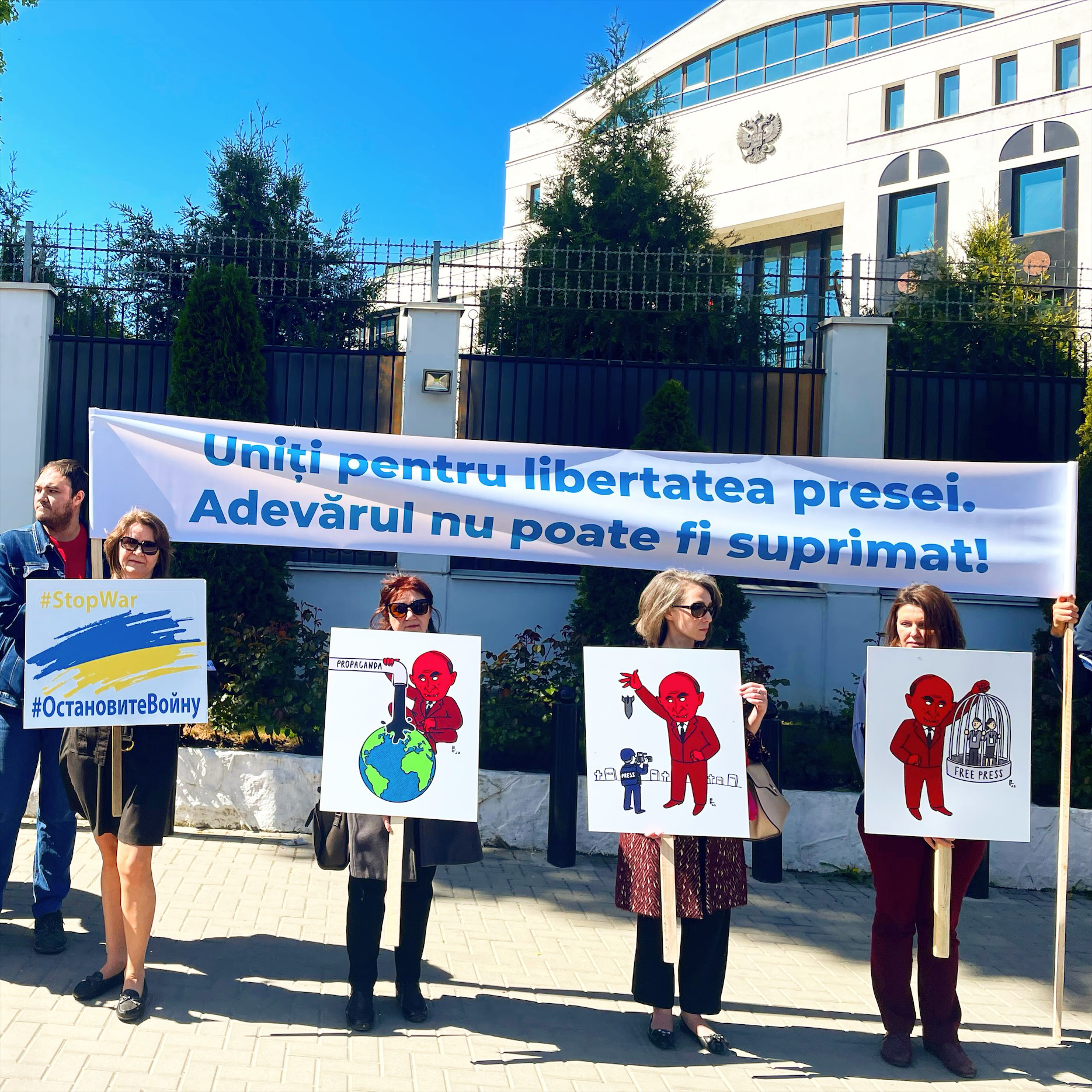Many journalists, activists, and media NGO representatives joined the protest in front of the Embassy of the Russian Federation in Chisinau on May 3, emphasizing how important it was for journalists to practice their work in a safe environment without the risk of being persecuted. The flashmob organized by the Independent Journalism Center (IJC) in the context of the Press Freedom Days was held under the slogan “United for Press Freedom. The Truth Cannot Be Suppressed!”
Media community and civil society organization representatives, civic activists, and students took part in the flashmob aimed at demonstrating the consequences of the war against the free and independent press: killing journalists in Ukraine, oppression of the press in Russia, and amplification of propaganda around the globe. At the same time, the participants showed their solidarity with their colleagues who reported from the scene of operations and did their job honestly in spite of the circumstances. They were wearing white ribbons with the sign of the Press Freedom Days. In addition to the white banner with the slogan of the event and placards with the message “Stop the War!” those present also held several caricatures depicting Vladimir Putin, President of the Russian Federation, throwing bombs at media representatives or caging them.
“Media professionals feel that honest and high-quality journalism in the region is currently being put to the test. Unfortunately, for the second consecutive year, we come to the headquarters of the Embassy of the Russian Federation in Chisinau to remind about the impact of the war on the free and independent press. Again, we are talking about killing journalists in Ukraine, suppression of the press in Russia, and amplification of propaganda around the globe. We would like to emphasize that it is important for journalists to practice their work in a safe environment without being persecuted,” Anastasia Nani, Deputy Director of the Independent Journalism Center, said.
TV8 journalist Mariana Rață who attended the event emphasized that the authorities could intervene when the law is breached or when it comes to unfair competition in the sphere of the media, but respect for the journalistic profession should be earned by its good practice. “The last year’s events show us that Russia has practically exceeded all the possible limits in suppressing the independent press, not only in Russia itself, but also the journalists from the international newsrooms who arrived to cover the events there. Such sorts of abuse committed by any political power should be condemned by journalists around the world,” she said.
“The situation has changed for the better, but this is basically probably because journalists have started realizing their power and demanding their rights over the years. It is our own attitude towards us that determines the others’ attitude towards journalists, including the authorities. The problems are old, the authorities have never liked any criticism from the independent press, and it has always had to struggle for its right to express its opinions, to criticize and reveal the violations committed by any ruling power,” Mariana Rață added for Media Azi.
“The Russian Federation’s invasion in Ukraine causes worrying precedents for the breaches of press freedom in the world; in this context, the recent arrest of an American journalist in Russia under accusations of espionage without providing any conclusive evidence in this regard should be mentioned. I mean Evan Gershkovich. Freedom of the press and freedom of expression are fundamental rights which are being breached abusively, especially in wartime,” Vitalie Popov, Executive Director of the HomoDiversus Association declared while attending the event.
Also on May 3, the IJC launched the Memorandum on Press Freedom from May 3, 2022, to May 3, 2023, to highlight the main issues and challenges the press in the Republic of Moldova was facing during the last year, such as the press’ reduced resilience to crisis situations, insufficient financial sustainability, obstruction of the right of access to information, and a decrease in public trust in information. These challenges have to be addressed efficiently and promptly, according to the IJC and eight other signatory media organizations.
